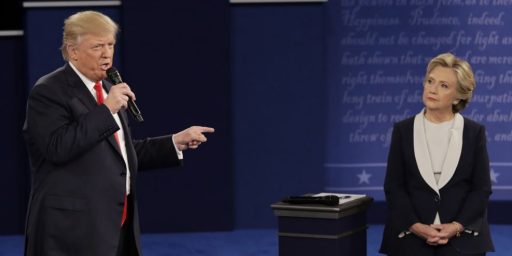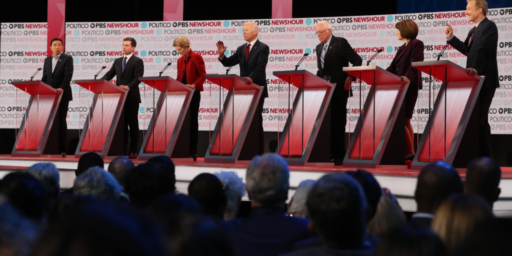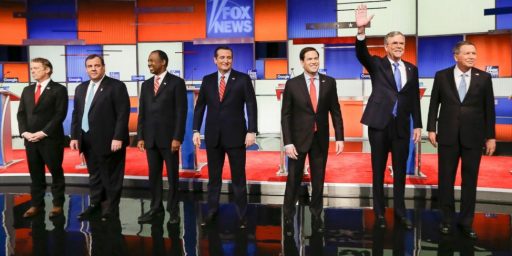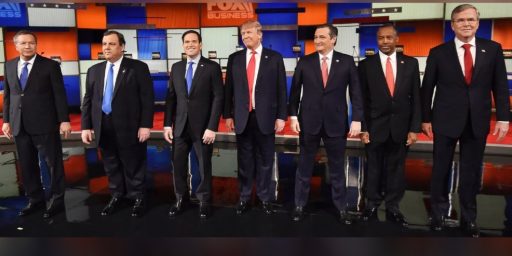First Democratic Debate Sets Viewership Record
The first Democratic debate drew record numbers on both nights.
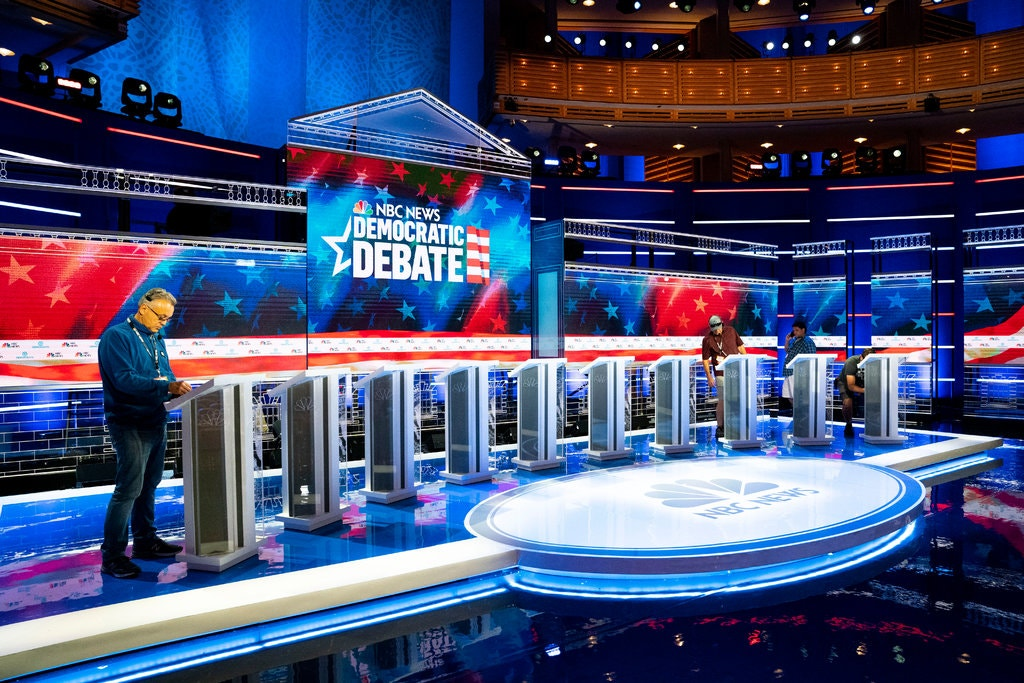
The first Democratic debate of the 2020 campaign cycle, broadcast exclusively on MSNBC, Telemundo, and on various NBC digital assets, ended up garnering some fairly decent viewership numbers for a debate at the start of the summer just a week before what for many will be a long holiday weekend.
First, Wednesday night’s debate ended up drawing some 15.3 million viewers, far exceedings NBC’s expectations:
MIAMI — Nearly 15.3 million Americans tuned in on Wednesday for the first debate of the Democratic nominating contest for president, a higher number than NBC News producers had anticipated and a sign of significant national interest in the 2020 campaign.
The television viewership nearly equaled the record for a Democratic primary debate, set in October 2015 for a matchup on CNN that included Hillary Clinton and Senator Bernie Sanders of Vermont.
By contrast, Wednesday’s debate was arguably the less enticing half of a two-day event in Miami, with only one candidate, Senator Elizabeth Warren of Massachusetts, in the top polling tier of the current field.
The big audience — 495 days before Election Day and seven months before the Iowa caucuses — suggests that Americans are already deeply invested in the contest over who will challenge President Trump next year.
The total number of viewers was likely bigger: The Nielsen ratings released on Thursday measured those who watched the prime-time broadcast across NBC, MSNBC and Telemundo, but did not include the audience for online video and streaming services. NBC News, the host of this week’s debates, said more than nine million people had seen its livestream of the two-hour event, with an average watch time of 40 minutes.
Mr. Trump’s emergence on the political stage has coincided with a jump in television news viewership. Early in the 2016 race, the primary debates were relegated to cable news stations. This year, NBC agreed to broadcasts on two consecutive weeknights, pre-empting lucrative entertainment programming.
According to Nielsen, about 8.7 million people watched Wednesday’s debate on NBC, 5.9 million watched it on MSNBC, and about 719,000 watched the Spanish-language simulcast on Telemundo.
Viewers appeared to stick around even as the debate moved into the 10 p.m. hour on the East Coast and a technical problem forced NBC to temporarily cut to several minutes of commercials. On MSNBC, viewership for the latter half of the event dipped only 4 percent from the 9 p.m. hour.
Not surprisingly, last night’s debate, which featured four of the top candidates in the field, garnered even higher numbers:
The viewers have spoken: Ready or not, the next presidential campaign is here.
NBC’s presidential debate in Miami on Thursday — seven months before the Iowa caucuses — broke the record for the biggest television audience for a Democratic primary matchup, a sign of widespread early engagement with the 2020 race.
Nearly 18.1 million Americans watched live on NBC, MSNBC, and Telemundo as 10 candidates clashed. The broadcast included a riveting exchange between Senator Kamala Harris of California and former Vice President Joseph R. Biden Jr.
The ratings, released by Nielsen on Friday, beat the 15.5 million viewers who watched the previous record-holder for a Democratic debate, a meeting of five candidates on CNN in October 2015. The audience was also greater than the one for Wednesday’s round of the Miami debate, which featured fewer star politicians and was seen by roughly 15.3 million viewers.
The numbers are a reminder of the power that prime-time television still holds to gather a national audience, even in an age of fractured and niche media platforms. And for Americans barely two and a half years removed from the ubiquity of the 2016 campaign, the ratings may provide the bracing realization that the next contest is already well underway.
“For a large segment of the American public, this was their campaign kickoff,” said Mark Lukasiewicz, a former producer of presidential debates at NBC News and now the dean of Hofstra University’s school of communication. “This was a broader audience than tunes in for hard-core political programming on MSNBC, Fox News and CNN every night.”
Even NBC News executives, who spent weeks promoting the event, did not anticipate an audience so large.
On the set in Miami this week, network officials took pains to play down expectations, reminding reporters that the debate was taking place in the nascent stages of the race and lacked the celebrity appeal of a candidate like Donald J. Trump, whose participation in the 2015 and 2016 forums sent ratings soaring.
But Mr. Trump’s presidency has galvanized — and polarized — many Americans who once paid only glancing attention to the details of the political world, turning White House advisers into household names and policy matters into fodder for dinner-table conversation.
The Nielsen ratings actually understated Thursday’s overall viewership, because they did not include online video and social media streams.
For the television news business, the high viewership is likely to turbocharge an already significant investment in political coverage, which has pushed up revenues and ratings.
And for candidates in the Democratic field, this week’s numbers will intensify the pressure to perform at their next major televised meeting, a debate in Detroit on July 30 and 31 hosted by CNN.
To be sure, these numbers fell short of some of the viewership numbers that the 2016 Republican debates drew. The first debate in August 2015, for example, drew 24 million viewers to Fox News Channel while the second debate in September 2015 drew some 23.1 million viewers, setting a record for CNN, which carried that day. Ratings were down for the third debate on CNBC, which was probably a good thing considering that the network was widely panned for the format of that debate. Ratings also slipped for the fourth debate on Fox Business Channel, which may have been a reflection of the fact that this channel isn’t available on many cable packages. When the candidates returned to CNN in December for the fifth debate, they drew 18 million viewers, down from the peaks of the early debates but still pretty high for a primary debate. A sixth debate among the Republican candidates in January 2016 drew some 11 million viewers. The final mass debate before the Iowa Caucuses, which President Trump skipped, drew just 12.5 million viewers, the worst of all the GOP 2016 debates. By the time the GOP was up to its tenth debate in late February, though, viewership had fallen to 14.5 million viewers.
On the Democratic side, though, the 2016 election cycle saw generally lower viewership numbers, in no small part because these debates were often scheduled at odd times, such as on a Sunday night and, in one infamous case, at the same time as the biggest college football game in the state of Iowa. The first debate in October 2015, for example, drew 15 million viewers, but that proved to be the peak. The second debate, set on a Saturday night in November, meanwhile, drew just 8.5 million viewers, and the third debate, held on a Sunday night, drew just 6.7 million viewers. The fourth debate, which was held in between the Iowa Caucuses and New Hampshire primary, drew even fewer viewers at 4.5 million viewers
Putting all this in perspective, then, the higher-than-expected numbers for the first debate certainly does seem to show that voter interest in the 2020 debate is high considering how early it is in the campaign season. Whether this helps or hurts Democrats or Trump, though, is unclear. Republicans, of course, won’t have any primary debates since Trump is unlikely to agree to debate former Massachusetts Governor Bill Weld, who has taken it on himself to launch a quixotic intra-party challenge to the President. What will be interesting to see if this interest continues into the second debate next month on CNN and those that follow, which will begin to feature fewer and fewer candidates as the criteria are tightened.


